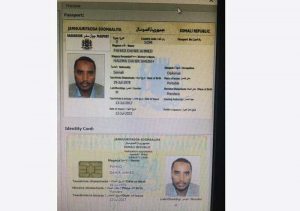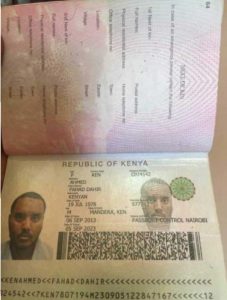Kenya investigates how Fahad Yasin got Kenyan passport
Fahad’s last week appointment as the spy agency’s deputy director seems to have piqued Nairobi’s curiosity.
By The Star Staff Writer
NAIROBI, Kenya – Kenyan authorities are investigating how the deputy director of Somalia’s national intelligence and security agency, Fahad Yasin, allegedly got a Kenyan passport, said local media.
Fahad, who was President Mohamed Abdullahi Mohamed Farmajo’s chief of staff until last week, was identified by Kenyan media as Fahad Dahir Ahmed with a Kenyan passport number C024542 and identification card number 22847167.
“We got this information and we are trying to investigate the details of the documents and how they were acquired by the individual,” Kenya’s Immigration Principal Secretary Gordon Kihalangwa, whose portfolio also includes border control and registration of persons, told The Daily Nation newspaper on Monday.
The Somali government hasn’t officially commented on the matter, and attempts to reach Somalia’s Minister of Information Dahir Mohamud Gelle were unsuccessful, as his phone was switched off.
The Standard, Kenya’s second largest newspaper, has published copies of Fahad’s purported Kenyan passport and identification card.

Kenyan officials didn’t say what triggered their investigation, but it seems that Fahad’s appointment as NISA’s deputy director on August 16 piqued Nairobi’s curiosity. Kenya’s law bars a dual citizen from holding a senior government position.
“Our investigative team is already on the ground to establish the veracity of the documents. What I know is that the Somali laws just like Kenya’s, provide for dual citizenship but how they go in terms (of) holding a senior position in their government, I may not know,” Kenya’s Director of Immigration Services Alexander Muteshi told The Daily Nation, the country’s largest newspaper.
Muteshi speculated that Fahad may have gotten the Kenyan documents after Somalia’s last central government fell apart in 1991.
“Majority of these people flocked into the country and ended up acquiring Kenyan documents but with stability normalising in Somalia, they are now trooping back,” Muteshi, a former director of counter terrorism coordination with Kenya’s spy agency, said.
According to The Standard, Fahad got his purported Kenyan passport on September 6, 2013 and the identification card on November 26, 2001.
The Somalia Star couldn’t independently verify the details reported by Kenyan media, whose coverage on Somali affairs are heavily influenced by the country’s intelligence agencies.
In May 31, President Farmajo appointed Fahad as his chief of staff, lauding him as a “clean, industrious young man.” Fahad, a close ally of President Farmajo, was Al Jazeera Arabic’s Somalia chief of bureau before joining politics.
Muteshi told The Standard that Kenyan authorities are not jumping to conclusions.
“Since he is a senior government official, we will handle the matter diplomatically with Somalia. In the investigations, we will seek to establish if he had lived in Kenya for at least for seven years to qualify for ID and passport,” said Muteshi.

It’s not uncommon for a Somali to have both Kenyan and Somali passports, as Somalis inhabit in northeastern Kenya.
British colonists added the Somali region to Kenya in the 19th century, a move that led Somalia’s then government to cut its diplomatic ties with Britain in 1963. A year earlier, Somalis in Kenya overwhelmingly voted to be part of Somalia, but both London and Nairobi ignored the results of the plebiscite.
After Somalis took up arms against Kenya to rejoin their kin, Kenyan security forces employed collective punishments, such as murdering entire villagers and placing the region’s inhabitants in concentration camps, among other human rights abuses.
On October 23, 1967, Mogadishu, which supported Somali separatists in northeastern Kenya, and Nairobi agreed to end the war. The agreement demanded that Kenya lift its emergency regulations on the Somali region, but Kenya didn’t fully fulfil that requirement.
Kenyan security forces have since that deal carried out massive massacres in the region, most notably the 1984 Wagalla massacre in which thousands of innocent Somalis were killed.
The Wagalla massacre was “the worst human rights violation in Kenya’s history,” according to the Truth, Justice, and Reconciliation Commission of Kenya, a body that was established in 2008 to investigate the human rights violations that took place in the country between 1963 and 2008.

